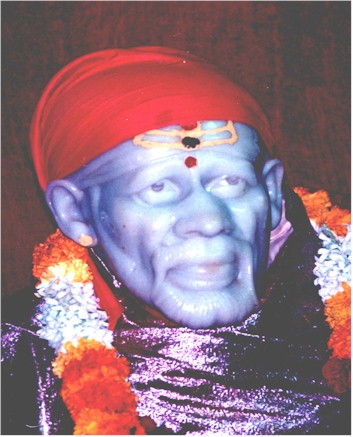 |
 |
|
 |
 |
Shirdi Saibaba

Origin of the name - 'Shirdi' Sai Baba :
Shirdi is a small village, 13 Kms. to the south of Kopargaon in Ahmednagar District of Maharastra State,India. Sri Sai Baba first came to Shirdi in about 1852 A.D. and stayed there for two years. He appeared again in Shirdi after 2-3 years along with a marriage party from Dhupkhede, when he was hardly a lad of 16 years in a dress of Kafni, dhoti and a to He was first greeted in Sri Khandoba's temple as " Aao, Sai, Aao" by Sri Mahalasapati, A goldsmith and manager of the temple and the name of Sri Shirdi Sai Baba was adopted to the young saint since then.
About Sai Baba:
Sri Sai Baba lived in the Masjid, named later on as Dwarakamai and led a simple life. Nobody knew 'whether he was a Hindu or a Muslim. He dressed like a 'Muslim but behaved like a Hindu. He gave medicine to the poor, nursed the sick and gave them 'udi'(Holy Ash) which proved to be more than medicine in miraculously curing from all diseases. His divine powers were first exhibited when he lighted lamps in which water was put in instead of oil. The saint used to collect alms in the village and put them in an earthen vessel and consumed as when required. His healing powers and selfless service to the poor attracted several devotees, who rushed to Shirdi and Shirdi became a place of pilgrimage. Morning and evening prayers(Arti) were started with great zeal.
Teachings:
He achieved spiritual unity amongst all sectors of the public. He preached the religion of humanity. He said that God alone was the doer of all things. He solved the difficulties of His devotees. Sri Sai Baba did not give lengthy discourses but told short stories full of wisdom. Faith and Forebearance were His key words. He did not write volumes or books but preached Love towards all. He lived a life of love, kindness, equality, brotherliness, renunciation and service. He was an incarnation of God.
Samadhi:
He laid down his mortal body on Dasara (15th October 1918) at Shirdi. There was a great fuss amongst the devotees of the Muslim and Hindu communities over the cremation of the dead body as both sects claimed Sri Sai Baba as belonging to their community. The dispute was decided by the then Collector of Ahmedna and accordingly Hindus buried him and a Sama dhi was constructed over the body.
Grace & Divine powers:
It is the belief of the devotee that the spirit of Sri Sai Baba still lives, comes out to give darshan at odd hours to the real devotees in time of their difficulties and gives them guidance.The real devotees of Sri Sai Baba come to Shirdi with such intense devotion that they feel as if dragged out of their homes for His darshan and they return with their hearts full of peace. Many devotees have been favored by Sri Sai Baba's grace. Some have been cured of their diseases, some could get sons, some were enriched, some were married as per their choice and some could find solace. Some ailing patients, who could not be cured by any medicine in the hospitals and who had lost hopes of cure, were cured merely by applying or eating 'Udi' (Sacred Ash) of Sri Sai Baba. The devotees of Sai Baba come from all countries of the world.
Devotees:
The devotees of Sri Sai Baba are from all castes, creeds, religions and all classes rich & poor. There is no discrimination. Any person of any community is allowed to perform, Pooja, Abhisekh ans Satyanarayana puja. The articles offered are mainly cloth, silver, gold and flower garlands. They are auctioned every thursday and sunday and the sale proceeds are credited to the funds of the Sansthan under various heads of account as indicated by the devotees. Many devotees give their donations for feeding the poor, for pooja, hospitals, medicines, utencils, benches in gardens, construction of buildings and various specific purposes.